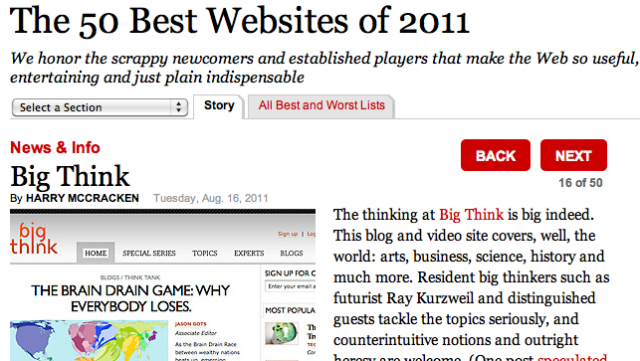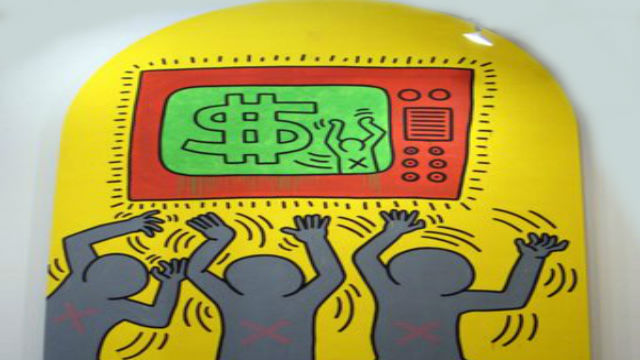Just like mechanical innovation in the 19th century, the still-evolving computing and communication innovations of the 21st century will profoundly impact the world’s economy.
Search Results
You searched for: Computers
In a previous post, we asked you who you want to see featured on video at Big Think. The response was overwhelming to say the least. From UAW President Bob […]
Stewart Brand’s famous maxim, “Information Wants to be Free,” has been, for more than 25 years, one of the most popular rallying cries of the Digital Age. These words have […]
A new approach to overcoming state-level Internet censorship relies, ironically enough, on a technique that security experts have frequently associated with government surveillance.
The march of technology and globalization has played out hugely in favor of high-skilled labor, but that march is now turning against skilled workers, promising to narrow the equality gap.
Steve Jobs and Apple’s ascendancy to the throne of world technology companies was not without its pitfalls. So what did the world’s foremost tech guru learn along the way?
For the past several weeks I’ve had severely limited internet access thanks to Itisalat and TE Data (two of Cairo’s least helpful internet providers), which has been responsible for the […]
–Guest post by Declan Fahy, American University. The interactive horror-themed websites Hotel626.com and Asylum626.com are the cornerstones of a complaint filed last week by a coalition of four consumer and […]
Author Carmine Gallo has studied Steves Jobs’ success and wants us to ask how can we learn to unleash our inner Steve Jobs to advance our business, our careers, and the world.
Internet users are being tracked all the time and shaking off a virtual tail can be tough. The desire to track users continues to outstrip privacy features in browsers.
BY JASON SILVA Physicist Freeman Dyson has spoken of a new “Age of Wonder” centered on computers and biology. He has artfully articulated that in the near future “a new […]
The “democratization” of space, including more involvement of amateur astronomers, is underway thanks to a ballooning and publicly accessible global astronomical database.
One in six children fail to read books as they spend increasing amounts of time texting friends, sending emails and visiting social networking sites, a new study has found.
From beating hearts to breathing lungs, livers to fallopian tubes, the list of organs replicated in miniature form using microchip technology is growing, revolutionizing how drugs are tested.
Infringement is different than ‘stealing’ in some very important ways. And yet, industry folks, politicians and law enforcement continue to claim that one is ‘no different’ from the other.
Cyber espionage and nation-state-backed hacking incidents appear to be increasing in frequency and severity. What once seemed the province of Hollywood has become real.
What constraints govern the physical process of computing? Is a minimum amount of energy required per logic step? There seems to be no minimum, but some other questions are open.
Even though it’s beneficial for the US to cooperate with the Chinese wherever and whenever possible, we must have the confidence and will to compete with them in markets where we can press our advantage and fortify our own economy.
As I washed the dishes and pans after our own Labor Day weekend gathering last night, I thought about some of the labor I’ve done over the years. I picked […]
Steven Pinker is a cognitive psychologist interested in language as a window into the human mind. In this excerpt from his linguistics lecture for the Floating University, he illuminates some of the mysteries surrounding children’s hardwired ability to learn language.
This past Saturday, October 15th, marked a momentous occasion in the history of cleanliness: the fourth annual Global Handwashing Day. Yes, it exists. Established by the Global Public Private Partnership […]
–Guest post by Jamie Schleser, American university doctoral student. Technological advances in how we communicate, from the advent of the printing press to the launch of the World Wide Web, […]
How can governments better assess the risks of new technologies? And why was Japan so stringent on earthquake regulations and not on nuclear energy?
Google has purchased Motorola’s cellphone business for $12.5 billion but it has no interest in making phones. Instead, Google needs Motorola’s patents to defend Android from lawsuits.
If astronomers spot a big one headed our way, our risk perception will switch to “It COULD happen to me, and SOON” and we’ll take the threat more seriously.
I served on a panel, Education in a Digital World, at the Iowa Education Summit today. Here is what I said during my 5 minutes of opening remarks. Good afternoon, We have to […]
What a wonderful surprise it is for us to find today that Time magazine has rated Big Think number 1 in News & Info in its list of The 50 […]
What’s the Big Idea? For some of us, it was Spock. For others, a humiliating performance as a pilgrim in the kindergarten musical. For me, it was William Blake’s relentless […]
With a well-established customer base, plus up and coming innovations in education and video, Amazon’s new tablet may be best poised the challenge the dominant iPad.
What will it take to build a spaceship capable of traveling to the stars? And what if you wanted it to be ready to launch in just 100 years? The U.S. military wants to find out.





























